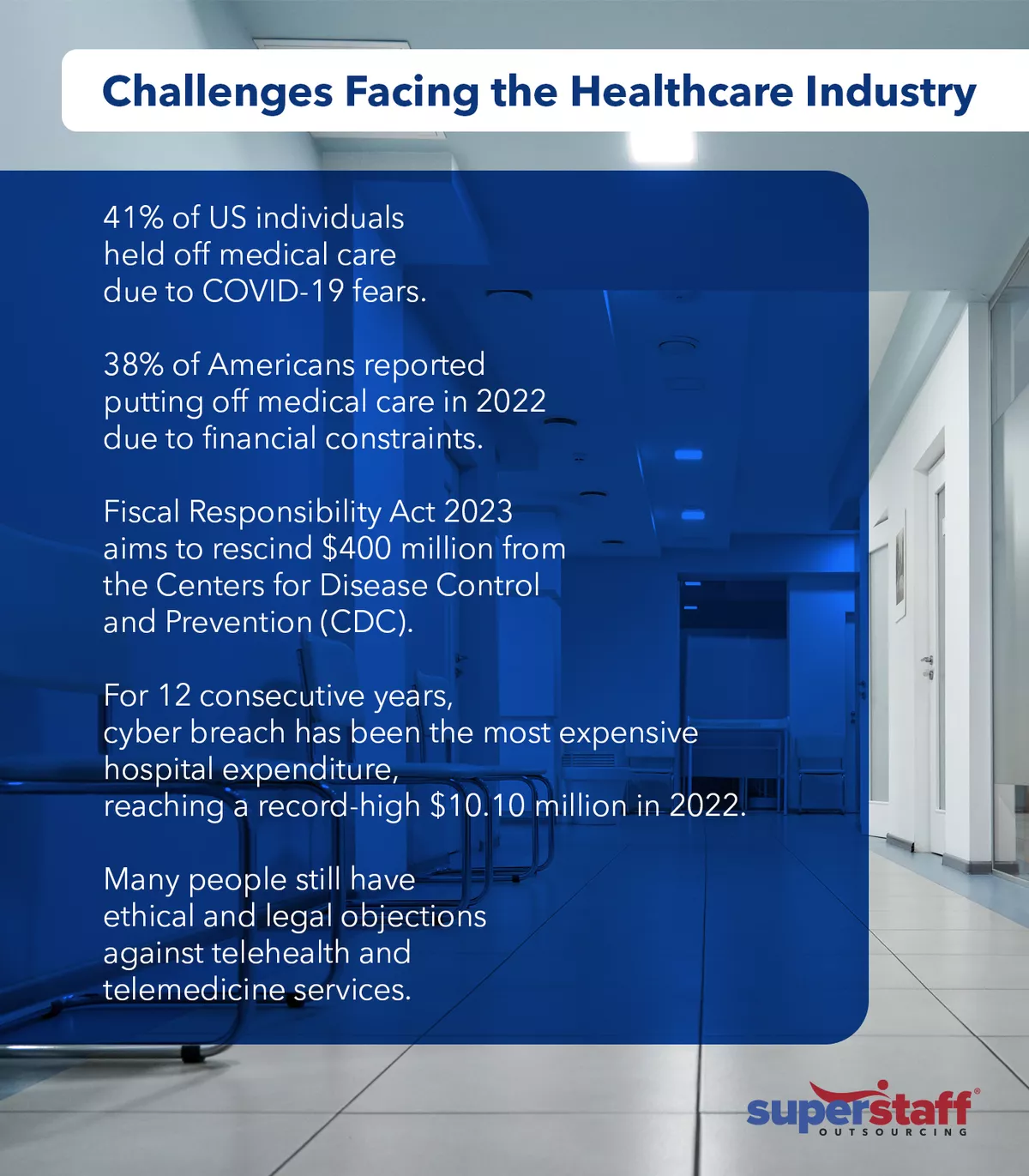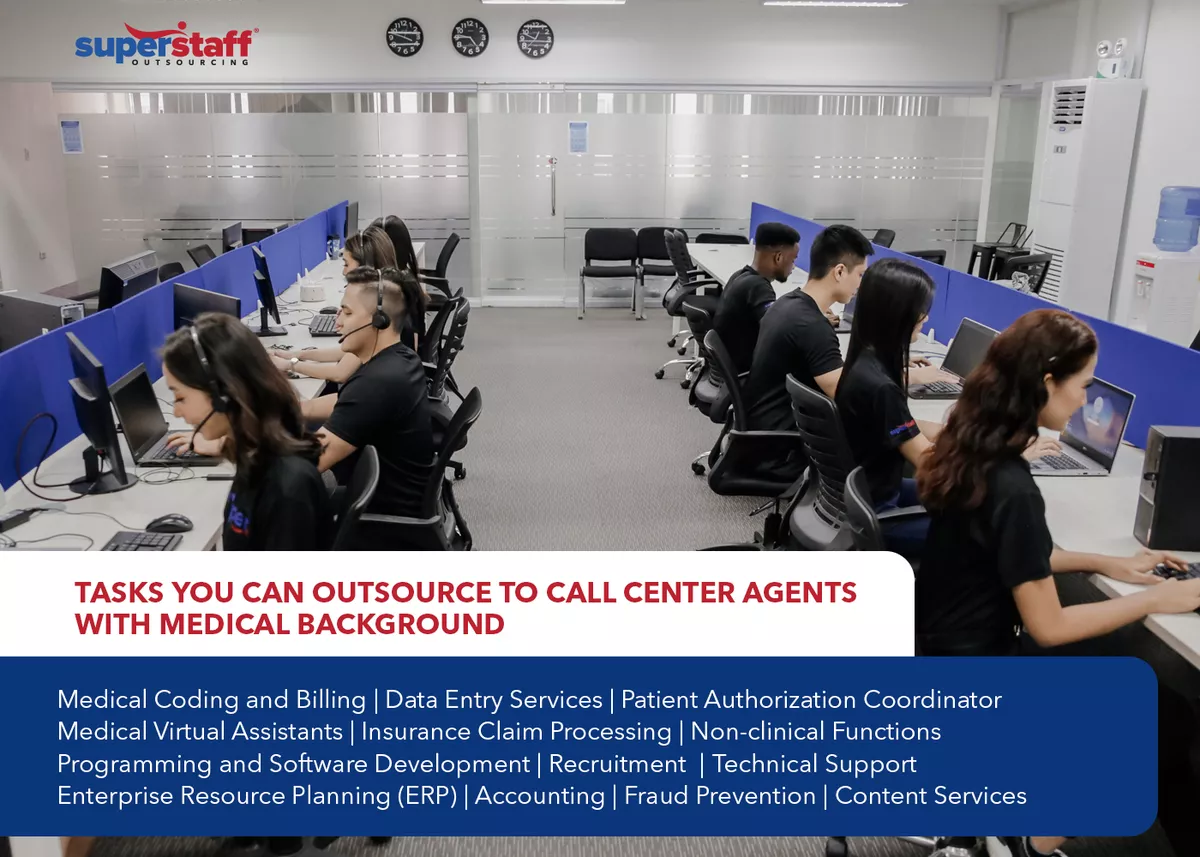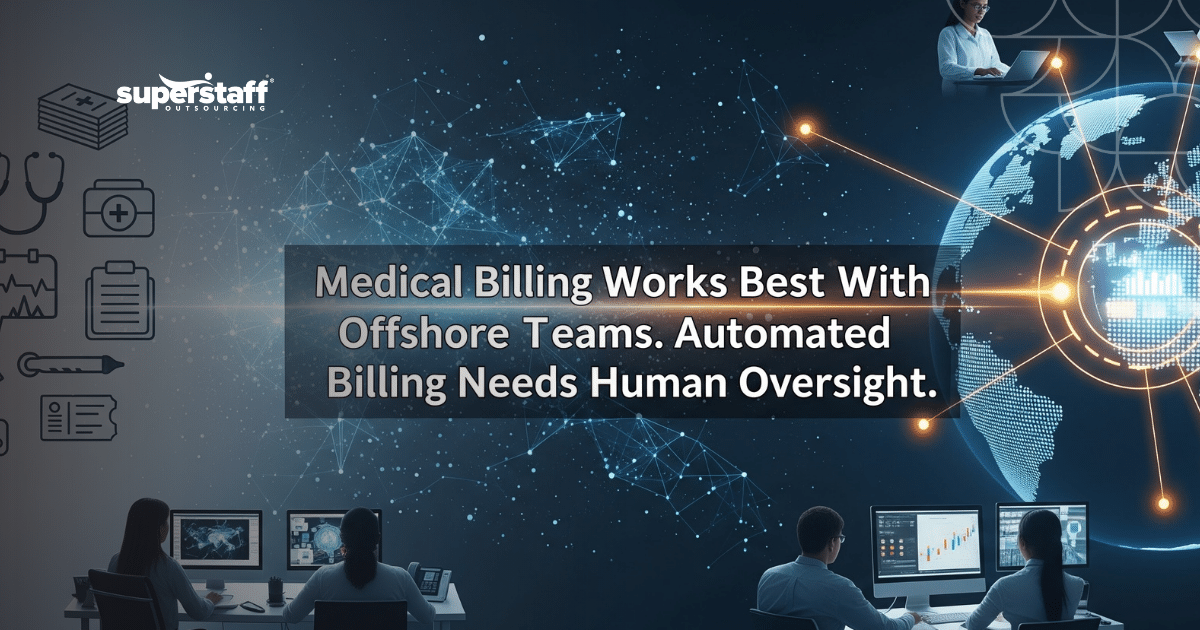
The healthcare industry spends millions every year upgrading its amenities, equipment, and medical staff training to stay competitive. However, since the pandemic reshaped patients’ preferences, patient experience has become just as crucial as any hospital infrastructure updates.
A study showed how bad patient experiences impact 44% of individuals, leaving medical centers with dire consequences. Check out these numbers:
- 34% of the patients defected to another healthcare provider or became skeptical of seeking treatment from the same center.
- 10% didn’t continue with their medical care or never collected their prescription.
With the stakes raised, more healthcare facilities are now prioritizing patient experience and satisfaction. One strategy they often leverage is outsourcing healthcare customer service representatives to medical call center services providers.
5 Challenges Facing the Healthcare Industry

Medical Treatment Postponement
In 2020, about 41% of US individuals held off medical care due to COVID-19 fears, with 12% avoiding urgent sessions and 32% avoiding routinary sessions.
Aside from that, many individuals grapple with financial constraints fuelled by high inflation rates. Consequently, 38% of Americans reported that they or a family member put off medical care in 2022, a 12% jump from 2021. In that regard, 27% delayed treatment for severe health conditions, while the other 11% did so for non-serious cases.
Women, younger adults, and lower-income people usually receive the blunt end of the stick since they’re more likely to hold off medical care for severe conditions than their counterparts.
With the number of people with chronic conditions already at epidemic levels, individuals can no longer afford to delay primary care. Several studies have highlighted the importance of early detection and immediate consideration, especially if the patients have disabilities or other underlying illnesses.
The Fiscal Responsibility Act 2023
President Joe Biden has approved the Fiscal Responsibility Act of 2023 (FRA) to rehabilitate the nation’s economic calamity, enforcing cuts in government expenditures. As a result, the budget allocation for non-defense discretionary projects may be reduced from $767 billion in 2023 to $704 billion in 2024 – and to $711 billion in 2025.
Since healthcare is part of the non-defense discretionary category, the US government may prune or even exclude funds for specific public health programs and services. Thus, patients may be forced to pay more for healthcare services to compensate for the lack of funds supposedly allocated to medical organizations.
The law aims to rescind $400 million from the overall budget of the Centers for Disease Control and Prevention’s (CDC) “Global Health Center” which safeguards Americans from expensive public health threats like COVID-19, HIV, malaria, and vaccine-preventable illnesses.
Furthermore, the law may slash an amount from the COVID-19 relief funds and repurpose them for other priority investments. Let’s take a look at the rough estimates of fund rescission from each activity or program:
- $10.419 billion of unobligated funds from The Public Health and Social Services Emergency Fund, which helps in the effort to prevent COVID-19 transmission.
- $864 million from the Defense Production Act, which assists the Department of Health and Human Services (HHS) tackle medical supply shortages during the pandemic.
Rise in Healthcare Cyber Attacks
Modern healthcare innovations and tech have leaped to the fore in providing patients with better care. Unfortunately, the emergence of tech in the medical system comes with a dangerous threat: healthcare cyber attacks.
Every year, the healthcare sector is plagued with online attacks — disrupting day-to-day duties and threatening the security of patient data. However, due to the overwhelming workload of healthcare workers, it can be difficult for them to stay updated on these online attacks.
In 2022, Check Point Research (CPR) found that healthcare centers encounter 1,426 attacks weekly — a 60% rise from the years before. Worse, many of the highly malicious preyed on these organizations.
One of the ramifications of cybercriminals is data breach. For 12 consecutive years, healthcare breach has been the most expensive cost for organizations, reaching a record-high $10.10 million in 2022.
Besides the breach of privacy and financial losses, there’s also ransomware, malware that blocks medical professionals from accessing patient data, leading to overcrowding of patients, longer wait times, and an increased risk to patients’ safety.
Here are some of the key findings from the Journal of the American Medical Association:
- The frequency of ransomware attacks in hospitals increased more than twice from 2016 to 2021.
- 44.4% of the attacks hampered the delivery of patient care.
- 8.6% of them severed healthcare operations for more than 14 days.
Legal and Ethical Limitations of Telehealth and Telemedicine Services
Social distancing became a common practice during the pandemic to reduce the risks of contagion among individuals in public places. In keeping with this practice, telehealth and telemedicine introduced remote patient care for increased access to healthcare.
Telehealth and telemedicine are consultations and medical coaching done online. The modalities for these systems include:
- Synchronous: Patient calls are done in real-time through various tech channels like mobile phones, tablets, or computers.
- Asynchronous: Healthcare representatives interact with patients by sending text messages and images. Generally, patients need to wait for responses.
Due to COVID-19, providers and consumers alike were more welcoming of this trend. By April 2020, 43.5% of Medicare primary care visits were done via telehealth, a steep jump from only 0.1% in February of the same year.
However, research indicates that many people still have ethical and legal qualms about these services, with the following being their top concerns:
- Incomplete disclosure of information about the risks and benefits of their treatment (87%).
- Lack of patient privacy (78%).
- Unauthorized access to data (74%).
- Medical malpractice by the practitioners (70%).
- Low quality of treatment (30%).
- Depersonalization of clinician-patient relationship (22%).
For the implementation of telehealth and telemedicine to be successful, there needs to be rigorous guidelines set in place that protect the interest of patients and ensure adequate healthcare delivery.
Lack of Skilled Professionals Handling Payment-related Processes
While patient care should be healthcare professionals’ primary responsibility, most are still bogged down by piles of administrative work, including managing payments.
Check out these highlights from the 2022 Medscape Report:
- On average, physicians report working as long as 15.48 hours weekly due to bureaucratic workload.
- If patients fail to settle their hospital bills, 43% of physicians still proceed with their treatment and establish a new payment plan.
When physicians are burdened with managing these burdensome responsibilities, their personal well-being and work-life balance may be put at risk. Many doctors have admitted that bureaucratic tasks, such as invoicing and paperwork, was the ultimate reason that led to their burnout. The added strain on their workload may cause them to commit inevitable errors in their admin work, like fiscal documentation and statements, which are costly.
In the same vein, most (45%) of healthcare providers only implement the fee-for-service (FFS) mode of payment. This means that patients pay their doctors for each treatment or service performed, like tests and office visits. Additionally, 33% suggest increasing support staff to reduce a physician’s workload.
6 Medical Customer Service Representative Duties That Lighten Load for Health Professionals

With their unmatched hospitality and established BPO landscape, it’s no surprise that the Philippines and Colombia are the destinations of choice for healthcare outsourcing solutions.
Hiring talents from these leading outsourcing destinations can help businesses build a support staff that can handle the following tasks:
Medical Coding and Billing
In 2022, over 33 million people were admitted to all the hospitals in the U.S. due to the rising number of patients with chronic illnesses. This, in turn, fuelled demand for medical coders and billers.
Who are these professionals and what does their job entail? Let’s find out.
Medical coding simplifies intricate yet important healthcare information such as healthcare procedures, medical diagnoses, services, and tools into standard medical alphanumeric codes.
Medical coders primarily utilize the International Classification of Diseases (ICD) or the Current Procedural Terminology (CPT)®, ensuring uniform documentation when codifying the relevant details.
By working closely with medical coding experts, medical billers decipher the codes to calculate the rates for billing. Then, a medical billing customer service representative will relay the breakdown of costs to the respective patients and collect payments from them. They also assist physicians and other healthcare practitioners in processing and accelerating insurance claims.
Data Entry Services
Aside from providing quality patient care, healthcare organizations are also responsible for collecting patient data and crucial medical information. Still, many healthcare workers are transcribing the data manually due to a lack of training and resources.
This raises the risk of committing inaccuracies that could potentially lead to serious medical errors such as misdiagnosis, surgical errors, or wrong prescriptions. In fact, research shows that death by medical error is already the number one cause of accidental death in the US.
Moreover, a different study revealed that 95% of businesses experience problems organizing raw and unstructured data. With the increasing volumes and variations of data received by hospitals and clinics daily, more businesses have turned to outsourcing medical data entry services for pertinent information such as:
- Patient data
- Charts
- Type of care
- Insurance programs
- Billing
- Information for claims data
By utilizing a customer data platform (CDP), medical call reps can generate and process patient data more efficiently and securely. Most importantly, the system is encrypted to prevent any online lurkings, malware, or breach by intruders.
Medical call reps in the Philippines and Colombia are well-trained in handling big data. Therefore, they observe the highest level of scrutiny in ensuring accurate data entry while providing the utmost protection to safeguard against leakage and losses.
Patient Authorization Coordinator
Medical tests, surgery operations, and healthcare amenities cost a fortune. Unfortunately, certain treatments and procedures are not covered by any insurance plans, regardless of how critical or necessary they may be.
With a reliable patient authorization coordinator, healthcare providers are ensured that patients will understand fully the limitations of their plans.
How does this process take place? Let’s dive in.
First, the healthcare center apprises an authorization coordinator of the incurred medical costs. After which, they verify the patient’s insurance plan and check how much of that cost will be funded. Their task also involves staying updated on the amended plan by the insurance company.
At times, they will be required to submit forms listing the patient’s condition and their concurrent treatments. If the company approves the coverage, the coordinator notifies the medical team to proceed. Otherwise, the plan is put on hold — unless the patient agrees to settle the payment out of their pockets.
The No Surprises Act (NSA) prohibits patients from obtaining unexpected medical bills and balance billing when seeking emergency or certain non-emergency services. Given that, a coordinator is responsible for documenting the insurer’s approval and keeping constant communication with them to avoid any last-minute refusals of certain medical charges.
Medical Virtual Assistants
In 2021, the global market size for virtual assistants in the healthcare industry peaked at $495.4 million and was poised to grow to $2.1 billion by 2031 – underscoring the huge potential of the market.
But why exactly is there a growing demand for virtual medical assistants in the healthcare industry?
Well, a virtual medical assistant communicates with medical practitioners or insurers to protect the best interests of healthcare organizations and patients. They are also responsible for:
- Handling all types of patient calls, providers, and insurance companies.
- Supporting healthcare providers through administrative work, such as data entry, scheduling of appointments, time-keeping, and email management.
- Develop a professional relationship between patients and providers.
- Taking charge of front-desk duties.
Healthcare companies can hire medical VAs from the Philippines and Colombia to take this step further. Aside from being proficient in English, they provide round-the-clock support for U.S.-based providers.
Insurance Claim Processing
A study in 2022 cited that one-third (31%) of claimants aren’t completely satisfied with their claims processing; 60% complained of slow settlements – stressing the urgent need to revolutionize insurance claim processing.
One major factor affecting the delays in claim processing is the heavy workload of claims processors. From submitting your provider’s insurance request to sorting out details in the documents, it’s clear that an insurance claim processing agent handles many tasks. They assess the claims, ensuring the information is adequate, valid, and fraudulent-free. These documents typically include receipts, photos, and original invoices.
To ease their burden, healthcare providers can leverage outsourcing. Outsourcing insurance claim processors from the Philippines and Colombia increases the possibility of one-time processing success. Providers can enjoy a faster completion time when processing claims with insurance companies.
Other Non-clinical Functions
Non-clinical roles are essential in establishing an excellent foundation for other clinical tasks. Here are 8 of them:
Programming and Development
Programming and development outsourcing involves assigning programming projects to third-party vendors like IT offshore or nearshore companies. For medical companies, this outsourcing solution helps build your medical and health information sites and secure your internal systems.
Since IT is a niche expertise, it is wiser for healthcare organizations to outsource a team of programming and development specialists to get work done efficiently.
Recruitment
The healthcare industry is ever-evolving, so hiring healthcare employees and practitioners who keep up with the latest medical standards is crucial. Medical organizations should consider recruitment process outsourcing (RPO) to augment talent acquisition efforts.
RPO offers strategic guidance in your hiring process to increase efficiency and flexibility. Besides, RPO agents utilize modern software like the applicant tracking system (ATS) to filter out candidates that don’t match specific criteria.
Technical Support
Imagine this: Your patient receives a nebulizer as prescribed by a licensed physician. However, they’ve learned that some functions are faulty after using the equipment for a while. What should be the patient’s next step? It’s contacting a technical support specialist with a medical background.
An outsourced technical support staff team can provide step-by-step instructions for their existing problem. Furthermore, they can educate consumers on the equipment’s various functionalities to obtain its full benefits.
Enterprise Resource Planning (ERP)
Amid government budget cuts in the health sector, hospitals can cut costs by up to 30% and drive 5% extra revenue by integrating different interrelating departments.
Using a comprehensive tool, ERP developers consolidate some modules — accounting, medical coding and billing, and patient management — into a singular system, making hospital operations faster, more convenient, and more streamlined for businesses and patients alike.
Accounting
A solid financial system is the foundation of healthcare providers fulfilling their primary purpose. Operational costs, patient care rate, and insurance care are essential in the operations of healthcare entities.
By hiring a reliable accounting services team, healthcare facilities can strategically insulate their financial functions from uncertainties.
Every year, Colombia and the Philippines produce thousands of certified public accountants skilled in financial management. These outsourced accounting experts will help you maintain timely and accurate financial reports, allowing you to make informed business decisions and prepare for unexpected market changes.
Fraud Prevention
Even noble fields like healthcare lose billions of dollars due to fraud. In 2022 alone, a healthcare fraud case was charged against 36 people who allegedly stole over $1.2 billion from local taxpayers.
A great strategy to avert this massive but avoidable revenue loss is through outsourcing. Outsourcing fraud prevention puts a stop to fraud at all levels. BPOs employ fraud detection experts who scan every transaction to alert them of red flags. Questionable transactions will then be taken down for thorough review to identify any bizarre or fraudulent activities.
Content Services
As the healthcare ecosystem becomes increasingly cutthroat, medical centers need quality content such as informative blogs, case studies, and infographics, to stand out from their online competition.
Fortunately, by investing in content services outsourcing, they are guaranteed engaging, people-first, high-quality content that will educate their followers about healthcare and their offered services.
Outsourcing Medical Call Center Services From the Philippines and Colombia
Our medical call center agents aren’t just a one-trick pony; they’re jack of all trades. From managing bills to processing insurance claims, we always aim to deliver excellent quality services. Since we deal with patients, we always respond and answer patient queries with empathy and sensitivity. After all, fantastic customer experience is at the core of our training.
SuperStaff’s headquarters in Colombia and the Philippines only accommodate a roster of talented and skilled call center agents. So, trust that your offloaded tasks are in good hands. On top of that, we have access to competent healthcare professionals, offering you diversified services that can be tailor-made according to your specific needs.
Contact us now to see how we can help you expand your healthcare services.






